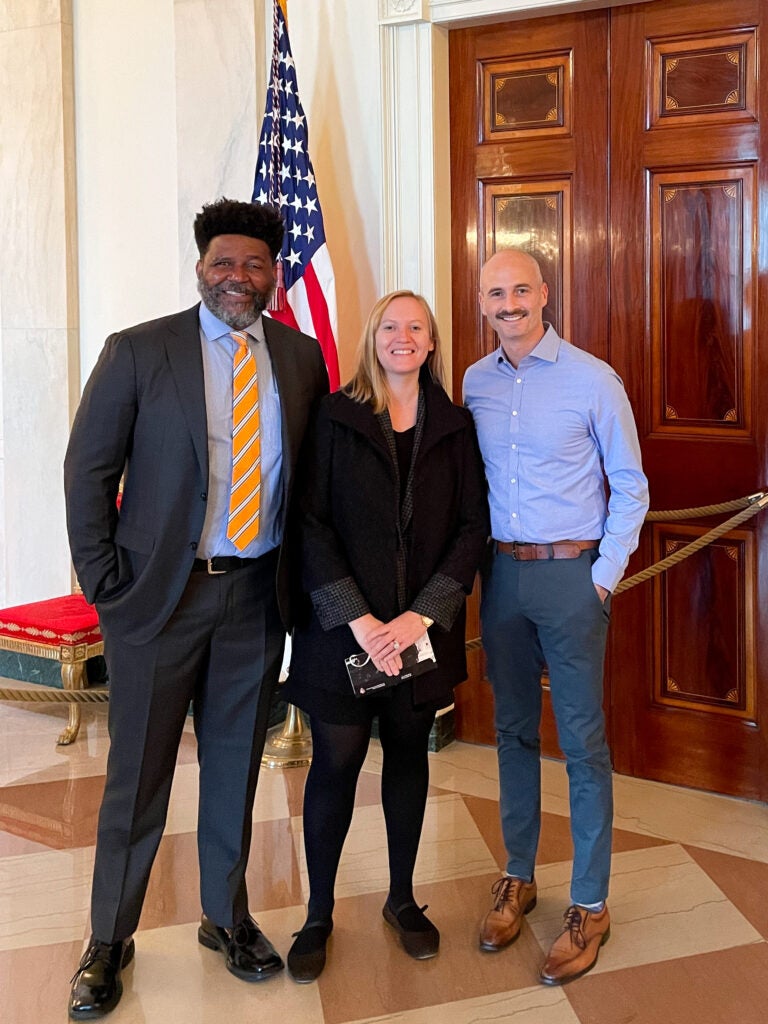Georgetown College of Arts & Sciences Professor Appointed Deputy Assistant Secretary for Policy Development at HUD
After teaching about housing policy on the Hilltop for the last decade, Brian McCabe (SFS’02) is now leading housing policy development for the Biden Administration within the Department of Housing and Urban Development (HUD).
Last summer, McCabe was appointed by the Biden Administration to serve as the Deputy Assistant Secretary for Policy Development in the Office of Policy Development and Research (PD&R). In the role, he leads a team of data analysts and policy experts examining issues of housing availability, affordability and access.
“Our office operates like an internal think tank at HUD,” explains McCabe. “The agency is responsible for most of the federal government’s housing policies, including public housing, community development and housing voucher programs, and our office works to ensure that policy decisions are evidence-based.”
An Associate Professor in the Department of Sociology and an affiliated faculty member in the McCourt School of Public Policy, McCabe is taking a hiatus from his own teaching and research to help direct federal housing policy. His portfolio includes efforts to expand homeownership opportunities, marshal resources for eviction prevention, improve access to rental assistance and more. Building from his career researching housing and homeownership, McCabe sees this federal service as an opportunity to durably shape housing policy.
“I’ve researched evictions in Washington, DC, and the role of local housing agencies in administering the Housing Choice Voucher program,” says McCabe. “This is the perfect role for me because I can draw on my research background to shape policy development.”
Building Equitable Housing Policy

From left to right: Corey D. Fields, Kristin Perkins and Brian McCabe (SFS’02) in the White House.
The Biden Administration is relying on HUD for policy analysis and program development at a time when public interest in housing policy and affordability is surging. More than eight in 10 Americans think that affordable housing is a problem in their local community, according to a Pew Research Center survey. Many of the projects in McCabe’s portfolio help to advance the administration goals around housing equity and justice.
“One exciting area of our work is Property Appraisal and Valuation Equity (PAVE) taskforce, an interagency group focused on addressing racial bias in the home appraisal process,” McCabe says. “We are pulling together a huge appraisal data set and then thinking about how we use that data to actually understand bias in the appraisal process, what it looks like and where it’s happening.”
As part of these efforts, McCabe chairs the Research and Data working group of the PAVE task force, which brings together 13 federal agencies. For McCabe, it’s a vital component of a larger effort to make housing work for everyone in the United States.
But addressing racial bias in housing markets is only one of the important pieces of the Biden Administration’s housing policy. McCabe also identified several other issues at the top of his agenda for policymakers, including increasing housing supply, expanding eviction prevention and tenant protection programs, broadening the availability of rental assistance and reframing housing as a climate justice issue.
On each of these issues, the federal government has a role to play. “We need to think about how we can increase the supply of housing units,” says McCabe. “That could involve working with local jurisdictions to change local zoning, decreasing the barriers to building housing and incentivizing the construction of affordable units.”
Acknowledging the Administration’s commitment to racial equity, McCabe is attuned to the ways that federal housing policies have disproportionately harmed those on the peripheries of society.
“Decades of federal housing policy have contributed to patterns of racial segregation and unequal access to opportunity in our cities,” McCabe argues. “Racist policies created the homeownership gaps between Black and white households. We have an obligation to address these injustices.”
Undergirding all of McCabe’s work is an understanding that access to safe, affordable housing access is vital to improving countless other quality of life measures.
“Housing is related to economic well-being, it’s related to health, it’s related to wellness and so much more,” McCabe says. “If we want to solve other problems, we have to tackle housing.”
From the Classroom to the World

Isaiah Fleming-Klink (SFS’19)
While McCabe isn’t currently in a classroom, his impact on current and former students has been profound.
“Professor McCabe was by far the most influential professor — and mentor — I had in college,” says Isaiah Fleming-Klink (SFS’19). “As one of the only professors at Georgetown teaching about housing and urban sociology, what I learned content-wise from Professor McCabe was — and is — fundamental to how I understand housing issues and policy in my work, even now.”
Fleming-Klink, who graduated with a degree in culture and politics, has continued pursuing housing policy and its impacts since leaving the Hilltop. After getting his foot in the door of municipal housing policy as a New York City Urban Fellow, Fleming-Klink worked as a strategic planning analyst at the New York City Housing Authority.
“Throughout my two years working in New York City after college, and into the present in the United Kingdom, Professor McCabe has been someone I’ve continued to work with and seek advice from,” Fleming-Klink says. “At basically every stage of my professional life, when I’ve been weighing a decision — to change jobs and to come to the United Kingdom — Professor McCabe has been one of the first people I call and one of the people whose opinion I respect and consider the most when making a decision.”
Fleming-Klink completed an M.A. in Social Research at the University of York last year and is now beginning an MSc in Housing and City Planning at University College London. He still works with McCabe, who advised Fleming-Klink’s thesis as an undergraduate, on research projects, including a forthcoming paper from McCabe and Eva Rosen on the landlord-tenant court in Washington, DC.
For McCabe, the connection between the classroom and the real world is quite clear.
“At Georgetown, we emphasize the importance of providing an education that equips students to solve complex, real-world problems,” McCabe says. “That’s what we’re doing every day here at HUD.”
-by Hayden Frye (CAS’17)
